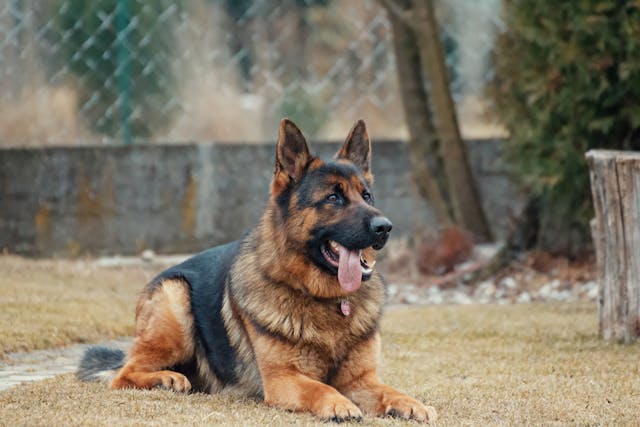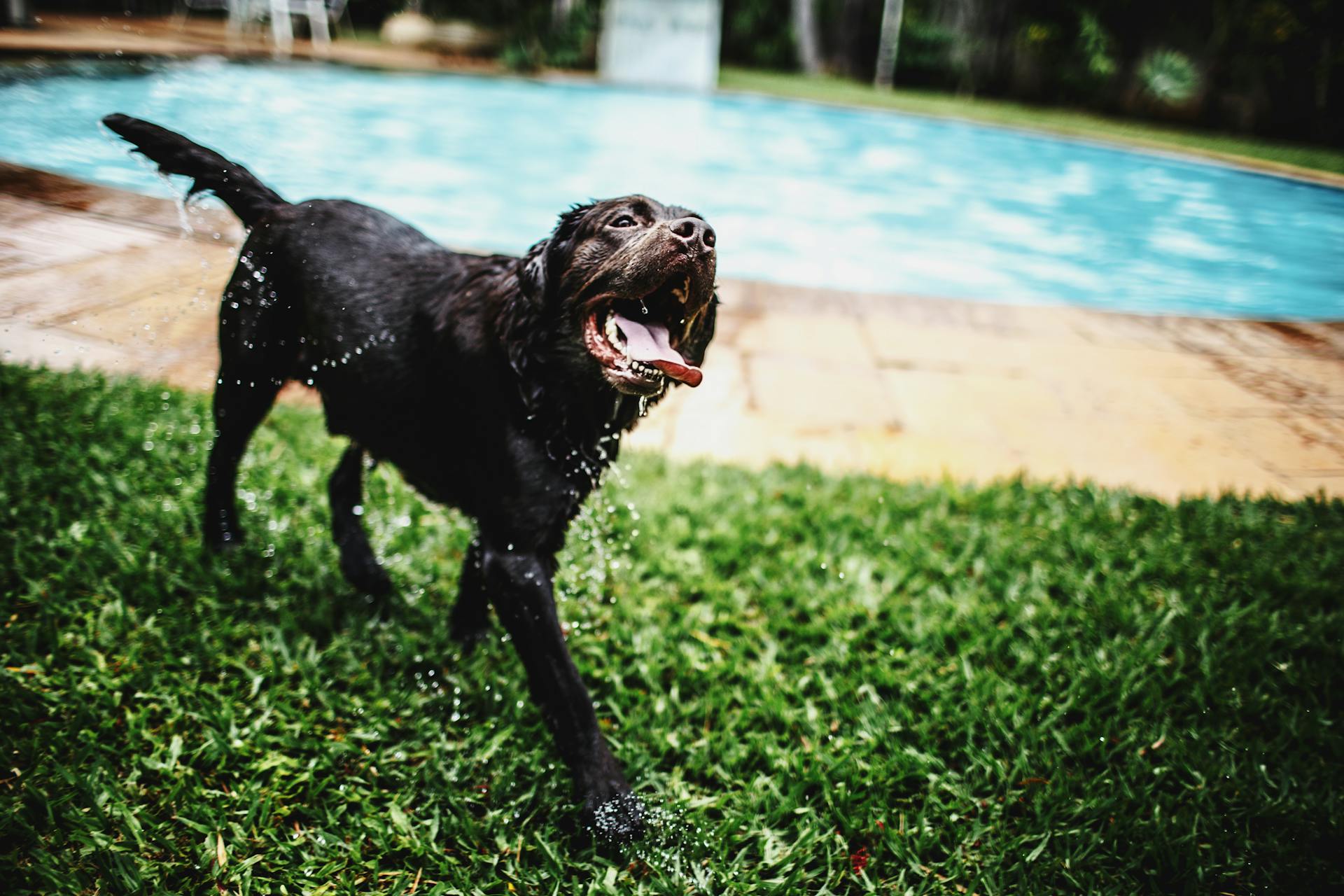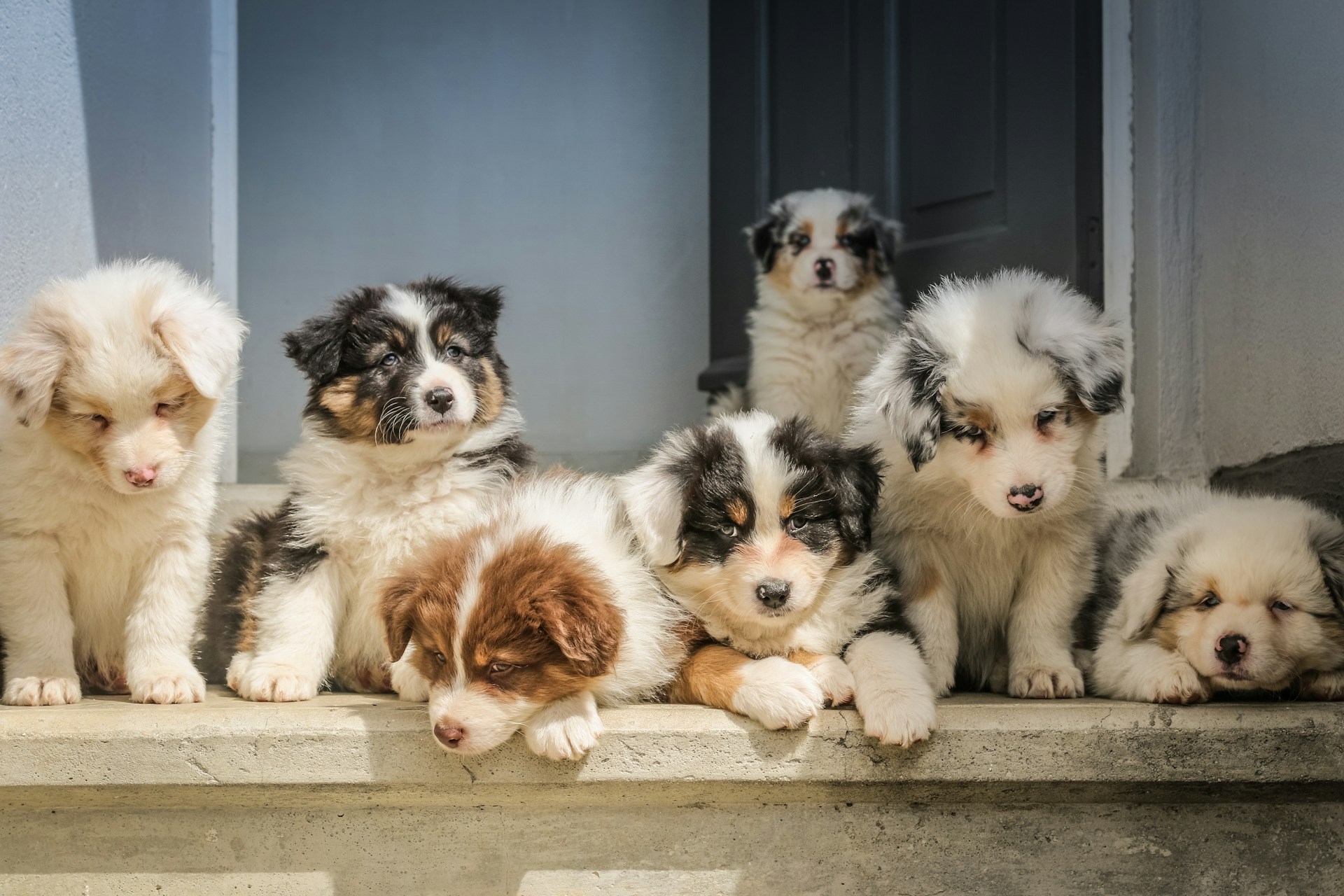Choosing between dog breeds can be very confusing considering each dog personality, nature and compatibility. In this blog let’s talk about German Shepherd and Golden Retriever both being very popular in their own ways. Golden Retriever being the favorite family dog and German Shepherd a protective and fierce dog.
Imagine the loyal, protective nature of a German Shepherd, standing guard and ready to play at a moment’s notice. Or picture the gentle, always-smiling Golden Retriever, whose affectionate nature can warm even the coldest hearts. Both breeds are fantastic, but which one is truly the best fit for your family? We will make everything very easy for you to understand about these 2 dog breeds. Let’s read.
Table of Contents
1. History and Origin of German Shepherd
The German Shepherd, bred in Germany in the late 19th century, was originally bred for herding sheep. Max von Stephanitz, the breed’s pioneer, aimed to create the perfect working dog. Today, they are renowned for their roles in police and military work, search and rescue, and as service dogs.
Physical Characteristics
German Shepherds are large, muscular dogs, typically weighing between 50 to 90 pounds. They have a dense, double coat that can be medium to long, with colors ranging from black and tan to sable.
Temperament and Personality
Known for their intelligence and versatility, German Shepherds are highly trainable and eager to work. They are loyal and protective, forming strong bonds with their owner and families. While they can be reserved with strangers, proper socialization ensures they are well-rounded and confident.
2. History and Origin Golden Retriever
Originating in Scotland during the 19th century, Golden Retrievers were bred for retrieving game during hunting. Their friendly and tolerant attitudes made them excellent companions, and they soon became popular golden star family puppies.
Physical Characteristics
Golden Retrievers are medium to large dogs, weighing between 55 to 75 pounds. They have a dense, water-repellent double coat that is golden in color, ranging from light to dark shades. Their expressive, friendly eyes and ever-wagging tails exude warmth and approachability.
Temperament and Personality
Golden Retrievers are celebrated for their friendly, tolerant demeanor. They are highly social and enjoy being around people and other animals. Their intelligence and eagerness to please make them easy to train.
3. German Shepherd Compatibility
Children: They can be very gentle, protective and patient, forming strong bonds with the younger members of the family. Their playful side shines through during games of fetch or backyard adventures, but their size and energy mean supervision is crucial to ensure everyone plays safely.
Other Pets and Dogs: With proper socialization, German Shepherds can coexist peacefully with other pets. They tend to get along well with pets, especially cats they grow up with, though they may need time to adjust to new animals entering the household. German Shepherds are generally good with other dogs, especially if they are socialized from a young age. However, they can be dominant, so supervision and proper introductions are important.
Playfulness: German Shepherds have a playful side and enjoy engaging in various activities. They thrive on mental and physical stimulation, making playtime essential.
Biting Tendencies: As working dogs, German Shepherds have a natural instinct to bite and herd. Proper training and socialization are key to managing and reducing any inappropriate biting behavior.
Sensitivity to Cold Weather: German Shepherds have a dense double coat that provides good insulation, making them relatively comfortable in cold weather.
Sensitivity to Warm Weather: Their thick coat can make them prone to overheating in warm weather. It’s important to provide plenty of water, shade, and avoid strenuous activities during hot days.
Good for First-Time Pet Parents: German Shepherds can be a handful for first-time pet parents due to their high energy and training needs. They require a committed owner who is willing to invest time in training and exercise.
Grooming Needs: German Shepherds shed year-round and require regular brushing to manage their coat. They have moderate grooming needs, including regular baths and nail trimming.
Good as a Service Dog: German Shepherds excel as service dogs due to their intelligence, trainability, and strong work ethic. They are often used in roles such as guide dogs, therapy dogs, and search and rescue.
Energy Level: German Shepherds are high-energy dogs that require plenty of exercise. Daily walks, play sessions, and mental stimulation are essential to keep them happy and healthy.
Training Needs: Their intelligence and eagerness to work make German Shepherds highly trainable. They excel in obedience training and are quick learners, but they need consistent, firm, and positive training methods.
Shedding Level: German Shepherds are heavy shedders, especially during spring and fall. Regular brushing helps manage the shedding.
Barking Tendencies: German Shepherds are also known to be vocal and may bark to alert their owners of anything unusual. Training can help manage excessive barking.
Health Issues: Common health issues include hip dysplasia, digestive problems, and allergies. Regular vet check-ups and a healthy diet are crucial for their well-being.
4. Golden Retriever Compatibility

Children: Golden Retrievers are renowned for their gentle and friendly nature, making them ideal companions for children. They are patient and tolerant, often allowing kids to climb and play with them without complaint. Their playful spirit matches well with children’s energy, ensuring endless fun and companionship.
Other Pets and dogs: Golden Retrievers are generally very sociable and get along well with other pets. Their friendly disposition means they are more likely to view other animals as friends rather than threats. Early socialization helps, but their natural inclination is to be welcoming and affectionate towards other pets. Golden Retrievers are typically good with other dogs and enjoy socializing
Playfulness: Golden Retrievers are highly playful and enjoy various activities, from fetch to swimming. Their playful nature makes them great companions for active families.
Biting Tendencies: Golden Retrievers are not known for biting tendencies. They are gentle-mouthed dogs.
Sensitivity to Cold Weather: Golden Retrievers have a thick double coat that provides good insulation, making them comfortable in cold weather.
Sensitivity to Warm Weather: Their dense coat can make them prone to overheating in warm weather. Ensuring they have access to water and shade and if possible an air conditioning environment is important during hot days.
Good for First-Time Pet Parents: Golden Retrievers are well-suited for first-time pet parents due to their friendly and easy-going nature. They are relatively easy to train and adapt well to family life.
Grooming Needs: Golden Retrievers require regular grooming to manage their shedding and keep their coat healthy. They need frequent brushing and occasional baths.
Good as a Service Dog: Golden Retrievers don’t actually excel as service dogs. They are often used as guide dogs, therapy dogs, and in other service roles.
Energy Level: Golden Retrievers have high energy levels and require regular exercise. They enjoy outdoor activities and running and need daily physical and mental stimulation.
Training Needs: Golden Retrievers are intelligent and eager to please, making them easy to train. They respond well to positive reinforcement and enjoy learning new commands and tricks.
Friendliness: Golden Retrievers are extremely friendly and social dogs. They are known for their affectionate nature and get along well with everyone, including strangers.
Barking Tendencies: Golden Retrievers are not known to be excessive barkers. They may bark to alert their owners or when excited, but they are generally quieter than some other breeds.
Health Issues: Common health issues include hip dysplasia, cancer, and heart conditions. Regular vet check-ups and a balanced diet are important for their health.
5. Living Environment of German Shepherd
Space Requirements: German Shepherds thrive in environments where they have plenty of space to roam and explore. They are better suited to homes with large yards or access to open areas where they can run freely. While they can adapt to apartment living, it requires a significant commitment to daily exercise and mental stimulation to keep them happy and healthy.
Outdoor Needs: These dogs love spending time outdoors. Regular walks, hikes, and play sessions in a fenced yard are essential for their well-being. They enjoy activities that challenge their physical and mental capabilities, such as agility training or playing fetch.
Climate Adaptability: German Shepherds have a dense double coat that provides good insulation, making them comfortable in cold weather. However, their thick fur can make them prone to overheating in warm weather. It’s important to provide them with plenty of water, shade, and avoid strenuous activities during hot days to prevent heatstroke.
Good for Apartments & Small Homes: Due to their size and high energy levels, German Shepherds are not ideal for small homes or apartments. They need plenty of space to move around and require a lot of physical activity. However, with sufficient exercise and mental stimulation, they can adapt to smaller living spaces.
6. Living Environment of Golden Retriever
Space Requirements: Golden Retrievers are adaptable and can live comfortably in a variety of living situations, including apartments and small homes. However, they do best in homes with access to a yard or outdoor space where they can play and exercise regularly.
Outdoor Needs: Golden Retrievers love being outdoors and thrive on activities that keep them physically and mentally engaged. They enjoy walks, runs, swimming, and playing fetch. Regular outdoor activities are crucial for their health and happiness.
Climate Adaptability: Golden Retrievers have a thick, water-repellent coat that helps them stay warm in cold weather. They can tolerate cold climates fairly well, but their dense fur can cause them to overheat in hot weather. Providing shade, fresh water, and limiting strenuous activities during warm days are important to keep them comfortable.
Good for Apartments & Small Homes: Golden Retrievers can adapt to living in apartments or smaller homes as long as they receive adequate exercise. They are generally calm indoors if they get enough physical activity and mental stimulation outdoors.
7. Cost of Ownership of German Shepherd
Initial Costs
- Purchase Price: The cost of a German Shepherd puppy from a reputable breeder typically ranges from $800 to $2,500, depending on factors such as pedigree, lineage, and breeder location.
- Adoption Fees: Adopting a German Shepherd from a rescue organization or shelter can cost up to $500 or sometimes even free, covering initial veterinary care and sometimes spaying/neutering.
- Initial Vet Visits: Initial veterinary expenses, including vaccinations, deworming, and a health check-up, can range from $100 to $300.
Ongoing Costs:
- Food: German Shepherds require high-quality dog food and snacks, costing approximately $50 to $100 per month, depending on the brand and size of the dog.
- Grooming: Regular grooming supplies, such as brushes, shampoo, and nail clippers, can cost around $20 to $50 per month. Professional grooming services, if required, can add to these costs.
- Healthcare: Routine veterinary care, including annual check-ups, vaccinations, and flea/tick prevention, can amount to $500 to $1,000 per year.
- Training: Basic obedience training classes or private sessions may cost $100 to $300. Advanced training or specialized training for activities like agility or therapy work can cost more.
- Supplies: Includes toys, bedding, bowls, and other essentials, costing approximately $20 to $50 per month.
Unexpected Expenses:
- Emergency Vet Visits: Costs for emergency veterinary care can vary widely depending on the nature of the illness or injury, ranging from $100 to several thousand dollars.
- Surgeries: Surgical procedures, such as those for hip dysplasia or injuries, can cost $1,000 to $5,000 or more.
- Long-term Medication: Costs for ongoing medications, such as for chronic conditions, can range from $50 to $200 per month, depending on the medication.
8. Cost of Ownership of Golden Retriever
Initial Costs:
- Purchase Price: Golden Retriever puppies from reputable breeders typically cost between $500 to $3,000, depending again on factors like pedigree, lineage, and breeder reputation.
- Adoption Fees: Adopting a Golden Retriever from a rescue organization or shelter usually costs between $50 to $500 and sometimes even free if the dog has any issues or is too old, covering initial veterinary care and sometimes spaying/neutering.
- Initial Vet Visits: Initial veterinary expenses, including vaccinations, deworming, and a health check-up, can range from $100 to $300.
Ongoing Costs:
- Food: Golden Retrievers require high-quality dog food, costing approximately $50 to $150 per month, depending on the brand and size of the dog.
- Grooming: Regular grooming supplies, such as brushes, nail clippers shampoo, and shampoo, can cost around $20 to $50 per month. Professional grooming services, if required, can add to these costs.
- Healthcare: Routine veterinary care, including annual check-ups, vaccinations, and flea/tick prevention, can amount to $500 to $1,000 per year.
- Training: Basic obedience training classes or private sessions may cost $100 to $300. Advanced training or specialized training for activities like agility or therapy work can cost more.
- Supplies: Includes toys, bedding, bowls, and other essentials, costing approximately $20 to $50 per month also depends on the owner.
Unexpected Expenses:
- Emergency Vet Visits: Costs for emergency veterinary care can vary widely depending on the nature of the illness or injury, ranging from $500 to several thousand dollars.
- Surgeries: Surgical procedures, such as those for cancer treatment or joint issues, can cost $1,000 to $4,000 or more.
- Long-term Medication: Costs for ongoing medications, such as for chronic conditions like arthritis or allergies, can range from $50 to $200 per month, depending on the medication.
Takeaway
Both dogs having their own characteristics and nature its can be hard to choose, In the end it solely comes to the owner on which type of life he wants to live in with their dog, like German Shepherd will need consistent training and exercise to keep up this physical and mental health so the owner also has to make dedicated time to handle such a dog. And on the other hand a Golden Retriever being an easy to train and playful dog is for those who don’t have time dedicated every day to give to their dog yet want to keep one with minimum care. It’s actually simple: you want a guard dog to choose a German Shepherd, you want a family dog to go for a Golden Retriever.
Frequently Asked Questions
1. Do Golden Retrievers have special dietary needs?
Being an active breed of dogs, golden retrievers require a well-balanced diet that will help in keeping them active yet healthy all their lives. They do best on high-quality dog foods rich in protein and other essential nutrients. This shall be served in portions to avoid obesity.
2. Are Golden Retrievers suitable for therapy work?
Yes, Golden Retrievers are known for their calm nature, intelligence, and affectionate nature—making them very well suited to therapy work. They enjoy interacting with people and will provide comfort and emotional support in the necessary settings.
3. Do Golden Retrievers shed a lot?
They do; they sport a thick double coat that sheds constantly throughout the year but excessively during seasonal changes. With a regular grooming practice and daily brushing, you will be able to reduce the amount of shedding of your German Shepherd and help him stay healthy.
4. Do German Shepherds really need a lot of exercise?
Yes, German Shepherds are active, energetic dogs that would have to be exercised much for health and enjoyment. They do really well as running dogs, ball-fetchers, or any other dog sport besides various activities that work out their minds, such as obedience training.





